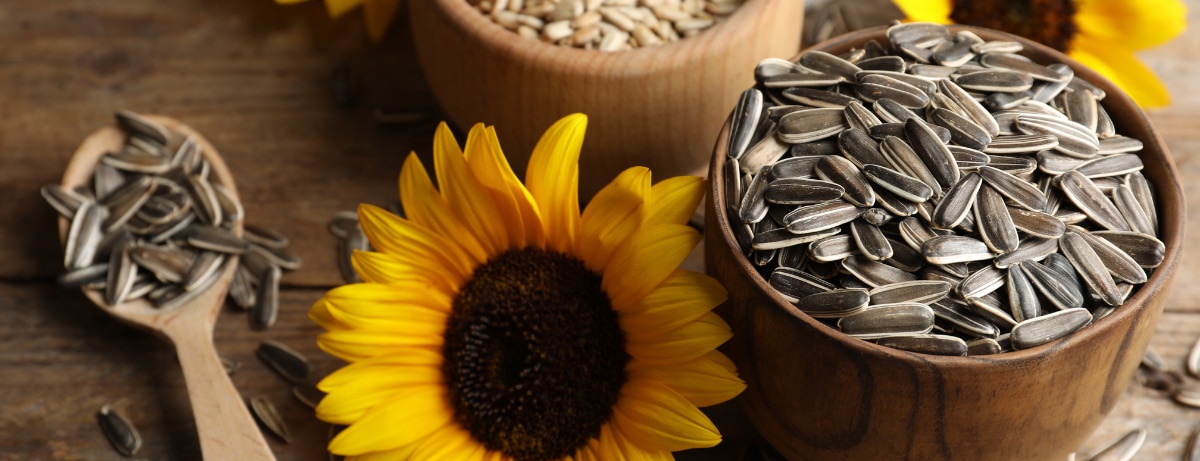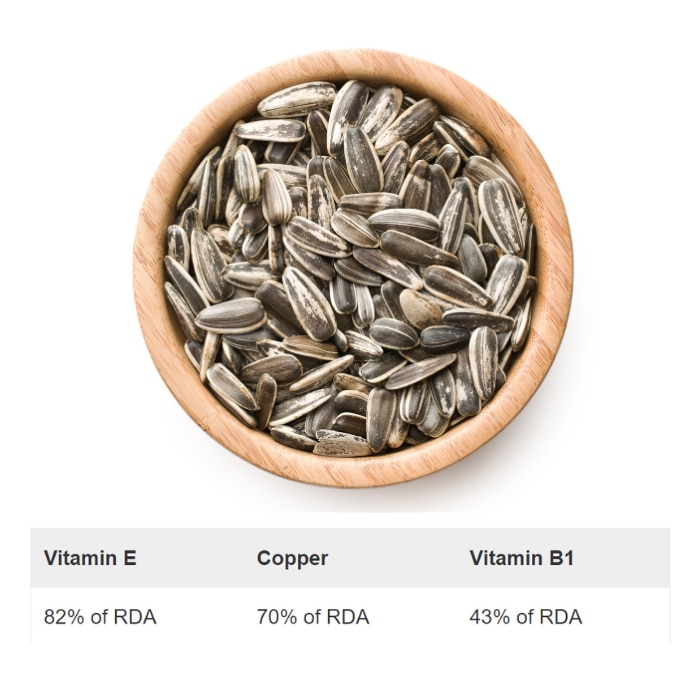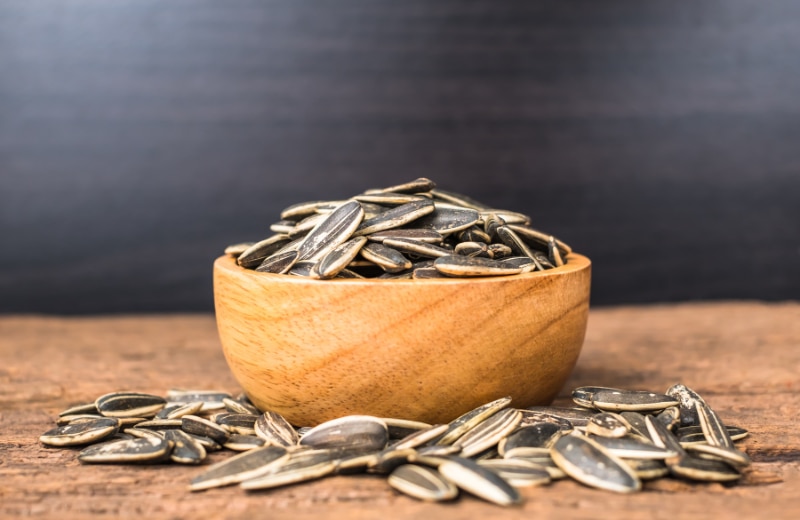15% off £35 OR 20% off £45
Benefits of sunflower seeds

Sunflower seeds are a great plant-based protein source that provides essential nutrients for both vegans and omnivores. Although ‘fashionable’ seeds like chia and flax are contemporary darlings of the wellness world, the health-conscious shouldn’t ignore sunflower seeds.
The minerals and compounds within sunflower seeds work hard to enhance health. Inside sunflower seeds are nutrients which boost immune system health, bone strength, and brain function.1
In this article, we’ll explain how sunflower seeds can support you in a healthy diet and lifestyle. We’ll break down their nutritional highlights - so you can discover all the good stuff inside sunflower seeds - and we’ll advise how to eat more. Finally, we’ll warn of any potential side effects.
Sunflower seed benefits
Sunflower seeds may be small, but their effects are mighty. Discover five health benefits of sunflower seeds below:
-
Anti-inflammatory properties
Inflammation in short bursts is a natural bodily response to outside invaders, whereas chronic inflammation (aka slow, long-lasting inflammation) is often associated with age-related disease development.2
Sunflower seeds are full of antioxidants that help combat inflammation in the body.3 In fact, one large study found that participants who ate sunflower seeds multiple times a week had lower levels of inflammation markers than those who didn’t.4 Having said this, it’s thought that the high level of vitamin E in sunflower seeds is thought to be one of the main contributing factors.5
-
2. Supports skin health
Did you know that sunflower seeds may be able to support your skin health too? Research shows that sunflower seeds contain fatty acids which can reduce skin dryness and improve the condition of your skin.6
-
Helps to improv heart health
Next up in our list of sunflower seed benefits is its effects on heart health. One scientific study showed that people at risk of heart problems who regularly ate sunflower seeds enjoyed better heart health than those who did not.7
This may be due to the magnesium contents in the seed, as it has been shown to help reduce blood pressure.7 One study using women with type 2 diabetes found that as well as reducing their blood pressure, the daily consumption of sunflower seeds also helped to reduce levels of “bad” (LDL) cholesterol and triglycerides.7
-
Helps to lower blood pressure
High blood pressure is strongly associated with poor health outcomes.8 Scientific evidence suggests that those who incorporate sunflower seeds into a balanced diet enjoy lower blood pressure than those who don’t.9
This is likely due to the fact that sunflower seeds contain a type of fatty acid called linoleic acid, which is said to relax our blood vessels, which consequently helps to lower our blood pressure.10
-
Aids in maintaining regular blood pressure
Lastly, sunflower seeds might also help to maintain regular blood sugar levels. Too-frequent blood sugar spikes can damage blood vessels and affect the health of our organs.7 This is where sunflower seeds come in, as they may help to normalise blood sugar levels when eaten daily as part of a balanced diet.11
Not only this, but eating sunflower seeds with carbs like bread may help to decrease their impact on your blood sugar levels. This is likely due to the fat and protein in sunflower seeds, which can slow down the rate your stomach empties and create a more gradual sugar release.12,13
Sunflower seeds nutrition
Sunflower seeds nutrition
Now you know their health benefits, let’s take a top-level view of sunflower seeds’ nutritional profile. A 35g portion of sunflower seeds contains:14
But what’s so special about these vitamins and minerals? We’ve highlighted their key roles in keeping us healthy below:
- Vitamin E consumption is associated with improved brain, heart, and eye health.15
- Copper helps the body produce blood cells, which transport oxygen throughout the body.16
- Vitamin B1 maintains the health of the nervous system and helps the body process energy from food.17


How to eat sunflower seeds
Not sure how to go about eating sunflower seeds? Don’t fear. Sunflower seeds are a very versatile ingredient, and you can often simply add them to your favourite dishes. Sprinkle seeds on soups, curries, and porridges to give an old favourite an extra nutrient hit and an added crunch.
Bakers often add seeds to bread and cakes for a delightful textural contrast, so you can choose baked goods with sunflower seeds already in them. Or if you fancy a sunflower seed snack, roast your sunflower seeds and enjoy them on the go.
Sunflower seeds side effects
Sunflower seeds are an allergen which can cause skin irritation and respiratory difficulties.18 People allergic to peanuts and tree nuts are more likely to be allergic to sunflower seeds than others.19
Eating large volumes of sunflower seeds has been known to cause constipation.20 Reduce your likelihood of developing constipation by removing skins before consumption.20
The final say
The final say
Who knew this humble seed packed such a punch? Sunflower seed benefits range from supporting skin health to maintaining blood sugar levels – and we think that’s pretty impressive.
As always, though, if you have any pre-existing medical conditions and you’re worried about eating sunflower seeds more often, do speak to your GP first.


Last updated: 17 February 2023
- https://time.com/5416869/are-sunflower-seeds-healthy/
- https://www.ncbi.nlm.nih.gov/pubmed/28003373
- https://pubmed.ncbi.nlm.nih.gov/28672789/
- https://pubmed.ncbi.nlm.nih.gov/16357111/
- https://www.ncbi.nlm.nih.gov/pubmed/11053781
- https://www.ncbi.nlm.nih.gov/pmc/articles/PMC5622016/
- https://pubmed.ncbi.nlm.nih.gov/24959542/
- https://www.heart.org/en/health-topics/high-blood-pressure/health-threats-from-high-blood-pressure
- https://go.skimresources.com/?id=41977X1601025&isjs=1&jv=15.3.0-stackpath&sref=https%3A%2F%2Fwww.healthline.com%2Fnutrition%2Fsunflower-seeds%23benefits&url=https%3A%2F%2Flink.springer.com%2Farticle%2F10.1007%2Fs11032-016-0527-2&xs=1&xtz=0&xuuid=0c476409350eba096c6f4c5177d59890&xjsf=other_click__auxclick%20%5B2%5D
- https://www.diabetes.co.uk/body/blood-vessels.html
- https://www.ncbi.nlm.nih.gov/pubmed/26931667
- https://www.ncbi.nlm.nih.gov/pubmed/26818604
- http://www.jocpr.com/articles/effects-of-sunflower-seeds-on-fasting-blood-glucose-in-diabetes-mellitus-type-2-patients.pdf
- http://www.whfoods.com/genpage.php
- https://ods.od.nih.gov/factsheets/VitaminE-HealthProfessional/
- https://www.nhs.uk/conditions/vitamins-and-minerals/others/
- https://www.nhs.uk/conditions/vitamins-and-minerals/vitamin-b/
- https://www.ncbi.nlm.nih.gov/pmc/articles/PMC5806758/
- https://www.networks.nhs.uk/nhs-networks/paediatric-allergy-network-of-east-anglia-panea/documents/educational-material/Cross-%20Reactivity%20in%20plant%20food%20allergy.pdf
- https://www.ncbi.nlm.nih.gov/pubmed/17036204













